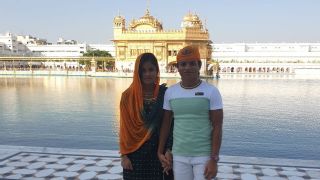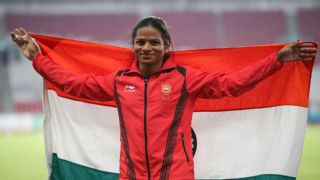|
Indian sprinter Dutee Chand [she/her], 25, came out publicly as a lesbian in 2019, and is recorded as one of her country's first out LGBTQ+ sportspeople. Chand is India's current women's 100m champion, and competed at the 2016 and 2020 Olympic Games. Chand was suspended from athletics by the IAAF in 2014 due to perceived female hyperandrogenism but that ruling was reversed in 2015 by the Court of Arbitration for Sport. What was the 'coming out to myself' process like for you? When I was at the sports hostel in Bhubaneswar as a junior, my closest friend was also my roommate. We belonged to the same district, had studied in the same school and as athletes living under the same roof, ate our meals together and shared a bed. I didn't know what being a lesbian meant. I had never heard of the term either. But when she entered into a relationship with a boy, I felt jealous. I couldn't understand why. I went through extensive medical tests during the hyperandrogenism issue in 2014, and I was told by the doctor that it was natural for me to feel attracted toward those of my gender. I had never felt the same way about someone from the opposite gender. [Then] I met my partner. She watches my races and prays for me, and I feel I can be myself around her. There was no one moment that I can pick and say, 'This is when it felt right'. This is the way I was born and I don't know any other way.  Did you have a specific reason for coming out to the media/public, rather than keeping your private life private? I [came] out [when] my elder sister went to press about my relationship. A year before it became public, I had confided in my mother and elder sister about my love for a girl and my desire to marry her. When relations between me and my sister got strained, she threatened to tell the media [details] about my same-sex relationship and in her anger for me went through with it. News stories were run about me in the local press, slowly it became national news so I decided to confront the situation and speak up for myself. READ: 17 LGBTQ+ athletes share their coming out journeys Has coming out impacted your career and opportunities at all? No, not really. Given what I went through with the hyperandrogenism case, I honestly wasn't sure what the regulations were for openly gay sprinters. When the news became public, I got a call from Athletics Federation of India president Adille Sumariwala. He told me not to worry and assured me that my orientation was strictly a personal matter and would have no bearing on my opportunities as an athlete. It was a relief to hear that at a time when I was facing intense backlash from family and neighbours. It's now been over two years since I've been out and my career has been unaffected by it. How has your sport changed with regard to the LGBTQ+ community during your career? When I was a young member at camp, I would watch how others would pass comments at now former athlete Pinki Pramanik over being seen with a female. After I came out, I didn't face that sort of talk within the athletics community. Athletes like Caster Semenya have chosen to get married to their partners and perhaps that has taught more people to understand and educate themselves before they judge. In the sport itself, though, I don't see too many big changes.  What is the most rewarding, and perhaps unexpected, part of being out? I can hold hands with my partner anywhere in public. Before I came out, we would stand on opposite ends of malls, parks, and streets. Now we travel together without fear of what people may say about us. The unexpected part has been the support I've received from people worldwide. My picture appeared on covers of big magazines, I was invited to a few top TV shows in India and the LGBTQ+ community has been welcoming of me. There are a few national level athletes who are in same sex relationships. They haven't come out in public but after I did, some of them reached out to me and said my act had opened up the way for them and they feel safer now. I hadn't imagined my coming out to have a wider impact on others' lives. What would your advice be to folks who are struggling with their identity? Trust your instincts and do what feels the most natural to you. Be prepared for some criticism from those around you but let me tell you, coming out can be really liberating. I don't regret it. In our country, culture and tradition are often used as tools to suppress people and communities. Resist it. Just like our minds, our bodies too are not built the same way. Love is a human right. Only you can decide for yourself who you really are, what kind of life you want to lead and with whom by your side. When debating coming out in your mind, what were your worst - and best - case scenarios? And did either come to pass? I had decided to come out to the world after the Tokyo Olympics [then still set for 2020], but since [my sister] made it public before I could, my biggest fear was being robbed of the opportunity to compete. I had already fought a tough battle over the hyperandrogenism rule to earn the right to run again, and I didn't want to throw that away. The best case scenario was me competing at the Tokyo Olympics and not having to hide who I am anymore. My career hasn't been hit by my coming out like I dreaded. I could race in Tokyo and come back home to the person I love. Did you ever feel any pressure, either internally or from speculating fans, to be a role model or an ambassador for the queer community? And is that something you embrace now? There have been a couple of cases in my home state, Odisha, of young same-sex couples who decided to get married, saying that I inspired them. It made me realise that people see me more than just an athlete. Fellow gay athletes who haven't made their orientation public yet often ask me when I'm throwing a wedding feast. I tell them that day might come in a few years. Before I came out, I was pretty sure I'd have to get married in secret. Not anymore. Jab shaadi karenge, duniya ko dikhake karenge [When I do get married, it will be for the world to see].
|
